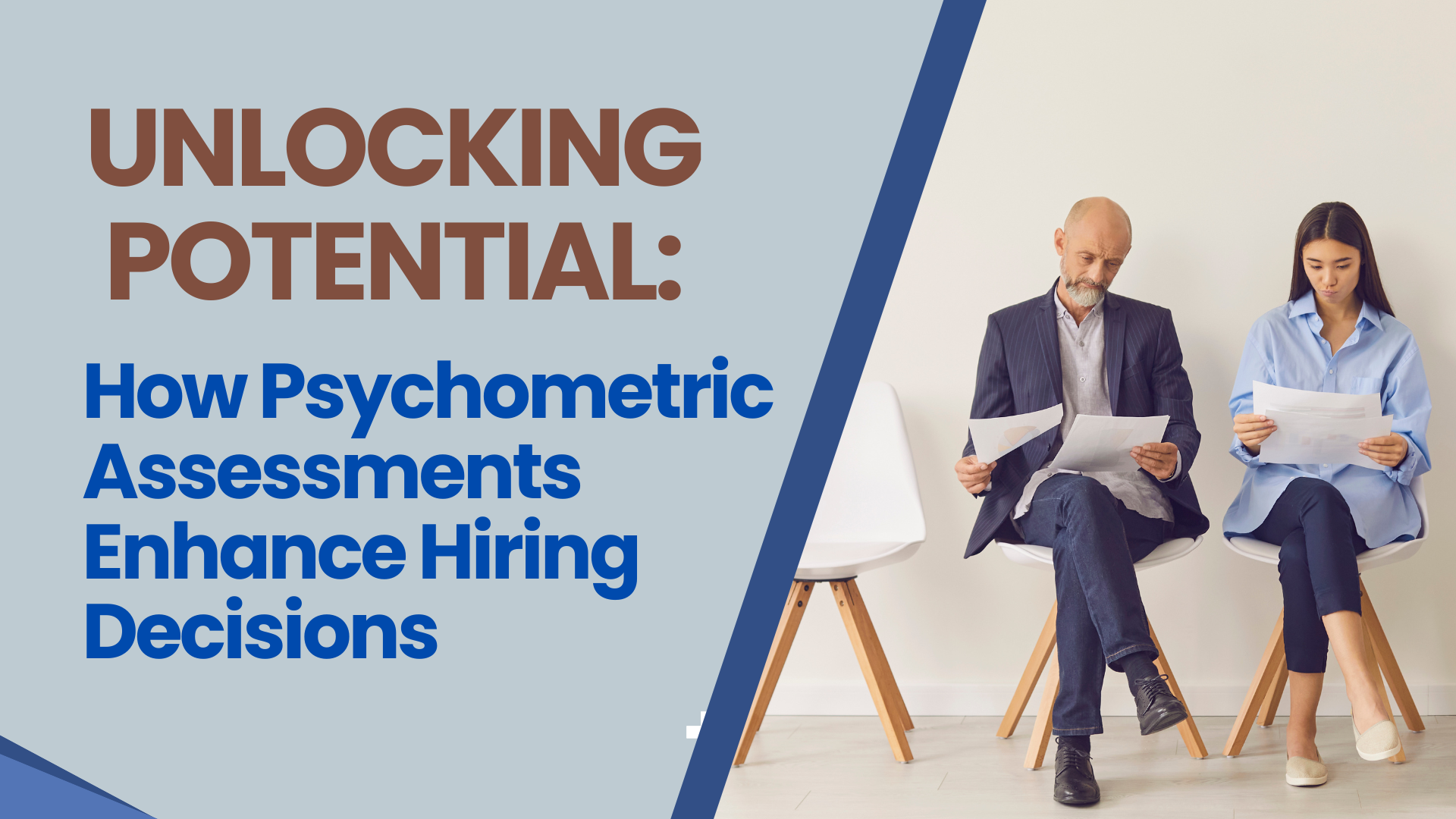
In today’s competitive
job market, finding the right candidate for a role is more complex than ever.
Beyond qualifications and experience, employers are looking for individuals who
align with their company culture, possess the right behavioral traits, and have
the cognitive abilities to excel. This is where psychometric assessments come
into play, offering a data-driven approach to make hiring decisions more
effective and insightful.
Psychometric
assessments go beyond traditional resumes and interviews, uncovering hidden
potential and ensuring the right fit for both the role and the organization.
Let’s explore how they enhance hiring decisions and help companies build
high-performing teams.
Purpose of Psychometric
Assessments
The purpose of
psychometric assessments in hiring is to:
Provide Objective
Insights: Measure candidates' abilities, personality traits, and behavioral
tendencies.
Reduce Hiring Risks:
minimize subjective biases and select the best fit for the role.
Predict Future
Performance: Assess the likelihood of success in a given position.
Enhance employee
retention: ensure cultural and role alignment, reducing turnover rates.
These assessments
empower recruiters with actionable insights, helping them make informed
decisions that drive long-term success.
Benefits of
Psychometric Assessments
1. Objective
Decision-Making
Psychometric tools
eliminate biases, offering a fair evaluation of all candidates based on
measurable data.
2. Improved Cultural
Fit
By analyzing
personality traits, employers can gauge how well a candidate will integrate
into the team and company culture.
3. Enhanced
Productivity
Hiring individuals
whose skills and behaviours align with the role leads to higher productivity
and engagement.
4. Reduced Turnover
A better match between
candidates and roles ensures job satisfaction, reducing attrition rates.
5. Cost-Effectiveness
Investing in
psychometric assessments during hiring prevents costly mistakes associated with
bad hires.
Role of Psychometric
Assessments in Hiring Decisions
1. Measuring Cognitive
Abilities
Cognitive ability tests
assess logical reasoning, problem-solving, and numerical skills, helping
recruiters identify quick learners and strategic thinkers.
Example: A company
hiring for a data analyst role uses cognitive assessments to measure analytical
skills and decision-making abilities.
2. Evaluating
Personality Traits
Personality tests
reveal how candidates handle stress, communicate, and work within a team.
Example: A sales
position requires an extroverted and persuasive personality, which can be
identified through psychometric profiling.
3. Predicting
Leadership Potential
Behavioral assessments
identify candidates with the traits necessary for effective leadership, such as
adaptability, empathy, and decisiveness.
Example: A
multinational corporation uses psychometric assessments to promote
high-potential employees to managerial roles.
4. Identifying
Development Needs
These assessments help
HR teams identify areas for improvement, enabling targeted training programs
for employees.
Examples of
Psychometric Assessments Enhancing Hiring Decisions
Tech Industry
A software development
firm implemented psychometric tests to assess logical reasoning and technical
aptitude. As a result, they reduced hiring errors by 30% and improved project
delivery timelines.
Healthcare Sector
A hospital used personality assessments to hire empathetic nurses and healthcare workers, enhancing patient satisfaction rates by 25%.
Retail and Customer
Service
A retail chain used
behavioral assessments to hire employees with high emotional intelligence,
leading to better customer interactions and increased sales.
Sudakshta: Transforming
Hiring Decisions with Psychometric Assessments
At Sudakshta, we
specialize in providing cutting-edge psychometric assessment solutions tailored
to your recruitment needs. Our platform offers:
·
Customizable Assessments:
Tailor tests to align with specific roles and organizational goals.
·
Advanced Analytics:
Leverage AI-driven insights to understand candidate potential.
·
Seamless Integration:
Easily incorporate our tools into your existing recruitment process.
·
Scalable Solutions:
Assess multiple candidates simultaneously without compromising accuracy.
·
Actionable Reports:
Receive detailed analyses that guide hiring decisions with precision.
With Sudakshta, you’re
not just hiring employees—you’re unlocking their potential for long-term
success.
FAQs
1. What are
psychometric assessments?
Psychometric
assessments measure a candidate’s cognitive abilities, personality traits, and
behavioral tendencies to determine their suitability for a role.
2. How do psychometric
assessments reduce hiring risks?
They provide objective,
data-driven insights that minimize biases and improve decision-making accuracy.
3. Can psychometric
assessments predict job performance?
Yes, these assessments
help predict a candidate’s potential to excel in specific roles based on
measurable attributes.
4. Are psychometric
assessments suitable for all industries?
Absolutely!
Psychometric tools can be customized for roles across industries, from IT to
healthcare and retail.
5. How does Sudakshta
support psychometric assessments?
Sudakshta provides
AI-powered, customizable assessments with real-time analytics to streamline
recruitment and ensure better hiring outcomes.
Conclusion
In a world where the
cost of a bad hire can be detrimental to businesses, psychometric assessments offer a reliable and effective solution. By unlocking the hidden potential of
candidates, these tools enable organizations to make smarter hiring decisions,
improve team dynamics, and drive long-term success.
At Sudakshta, we are
committed to helping businesses thrive by offering innovative psychometric
assessment solutions. With our expertise, you can identify top talent, reduce
turnover, and build high-performing teams that achieve organizational goals.
Unlock the potential of
your workforce with Sudakshta’s psychometric assessments and revolutionize your
recruitment process today!